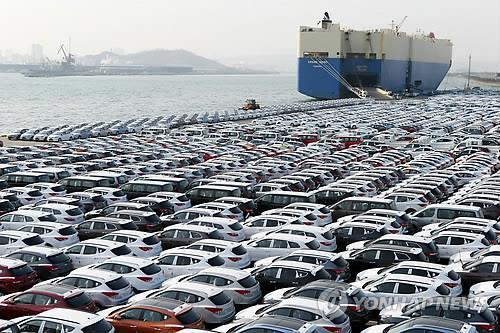South Korea’s exports plummeted 18.5 percent in January from a year ago, recording the largest year-on-year fall since August 2009 when the country was reeling from the global financial crisis.
 |
(Yonhap) |
Exports from Korea had been on a downward path for 13 months straight, along with a continuous drop in oil prices and slowing demand from emerging countries, sparking red alert in Asia’s fourth-largest economy, which heavily relies on exports for growth.
Overall outbound shipments reached $36.7 billion last month, compared to $45.1 billion a year ago, according to data from the Ministry of Trade, Industry and Energy.
Imports also tumbled 20.1 percent on-year to $31.4 billion last month, bringing the trade surplus to $5.3 billion.
The country has posted a trade surplus for the 48th consecutive month, but the amount of positive trade balance dropped slightly by $500 million from $5.8 billion in the same month last year, the ministry said.
“Conditions for export recovery appear to be unfavorable due to worsening external factors such as slowing economies in emerging countries as well as the possibility of oil prices dropping further,” an official said.
Outbound shipments also declined 5.3 percent on-year in terms of volume, as demand cooled for major export items such as smartphones.
By category, exports of petroleum products and electronic devices nosedived, falling 35.6 percent and 29.2 percent, respectively. Other major export items such as automobiles and steel were also bearish, marking a decline of 21.5 percent and 19.9 percent on-year last month, respectively.
In contrast, exports of organic light-emitting diodes and cosmetics continued to rise, growing by 8.7 percent and 2.1 percent, respectively.
By region, outbound shipments to China, which is Korea’s largest export destination, dropped 21.5 percent on-year due to the neighboring country’s slowing economy.
Exports to the U.S. also fell 9.2 percent mainly on weak demand for steel and semiconductors, while shipments to European Union member countries rose 7.3 percent.
Meanwhile, South Korea’s current account surplus exceeded the $100 billion mark for the first time last year as imports dropped significantly compared to exports.
According to separate data released by the Bank of Korea on Monday, South Korea recorded a $105.9 billion surplus in its current account in 2015, up 25.6 percent from the previous year.
The reduction in imports was partly due to falling crude oil prices, as well as global economic slowdown, said the data.
Experts, however, warned that the current account surplus is seen as “recession-type,” which could push the value of the local currency and negatively affect exports.
By Cho Chung-un (christory@heraldcorp.com)




![[Herald Interview] 'Trump will use tariffs as first line of defense for American manufacturing'](http://res.heraldm.com/phpwas/restmb_idxmake.php?idx=644&simg=/content/image/2024/11/26/20241126050017_0.jpg)

![[Health and care] Getting cancer young: Why cancer isn’t just an older person’s battle](http://res.heraldm.com/phpwas/restmb_idxmake.php?idx=644&simg=/content/image/2024/11/26/20241126050043_0.jpg)

